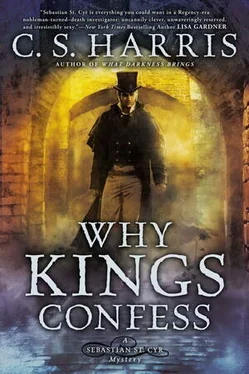C. Harris - Why Kings Confess
Здесь есть возможность читать онлайн «C. Harris - Why Kings Confess» весь текст электронной книги совершенно бесплатно (целиком полную версию без сокращений). В некоторых случаях можно слушать аудио, скачать через торрент в формате fb2 и присутствует краткое содержание. Год выпуска: 2014, Издательство: Penguin Group US, Жанр: Исторический детектив, на английском языке. Описание произведения, (предисловие) а так же отзывы посетителей доступны на портале библиотеки ЛибКат.
- Название:Why Kings Confess
- Автор:
- Издательство:Penguin Group US
- Жанр:
- Год:2014
- ISBN:нет данных
- Рейтинг книги:5 / 5. Голосов: 1
-
Избранное:Добавить в избранное
- Отзывы:
-
Ваша оценка:
- 100
- 1
- 2
- 3
- 4
- 5
Why Kings Confess: краткое содержание, описание и аннотация
Предлагаем к чтению аннотацию, описание, краткое содержание или предисловие (зависит от того, что написал сам автор книги «Why Kings Confess»). Если вы не нашли необходимую информацию о книге — напишите в комментариях, мы постараемся отыскать её.
Why Kings Confess — читать онлайн бесплатно полную книгу (весь текст) целиком
Ниже представлен текст книги, разбитый по страницам. Система сохранения места последней прочитанной страницы, позволяет с удобством читать онлайн бесплатно книгу «Why Kings Confess», без необходимости каждый раз заново искать на чём Вы остановились. Поставьте закладку, и сможете в любой момент перейти на страницу, на которой закончили чтение.
Интервал:
Закладка:
“Mind if I ride along?”
“Actually, yes.”
The Viscount smiled. “I won’t stay long. I take it you’ve heard that Monsieur Harmond Vaundreuil is leaving London?”
“I have.”
“Was that your doing?”
“Not entirely.”
“But you did send someone to follow his daughter.”
Jarvis leaned back in his seat and simply raised his eyebrows.
Devlin said, “Vaundreuil thinks you killed Pelletan and Foucher.”
“Harmond Vaundreuil is a venal, foolish man. Why would I bother to indulge in such ghoulish theatrics when I already had the head of the delegation on my payroll?”
“Perhaps Pelletan and Foucher threatened to expose Vaundreuil to Paris.”
“Ah. In that case they most definitely would have needed to be eliminated. However, to my knowledge, Foucher at least remained blithely ignorant of Vaundreuil’s treasonous activities. And as you know, my knowledge is quite extensive.”
Devlin stared out the carriage window at a ragged young crossing sweep leaping out of their way. “You told me once that you had a man watching the Gifford Arms the night Pelletan was killed.”
“Yes.”
“Tell me again what he saw.”
Jarvis sighed. “Really, Devlin; this obsession of yours is becoming rather tiresome.”
“Humor me.”
“Very well. Let’s see. . An unidentified man and a veiled woman arrived by carriage; for reasons doubtless understood better by you than by my informer, Pelletan elected to speak with them outside the inn rather than inside. The exchange was heated, but since my agent unfortunately lacks your acute hearing, the subject of that conversation remains unknown.”
“And then what happened?”
“The man and woman returned to their carriage, leaving Pelletan on the pavement in something of a passion. He was still standing there when Alexandrie Sauvage arrived. They also quarreled. Pelletan then returned to the inn and came out again wearing a greatcoat and gloves, after which he and Sauvage went off in a hackney.”
Jarvis was aware of Devlin sitting forward, his lips parted.
“What?” asked Jarvis, looking at him with disfavor.
“And the man and first woman? You said they returned to their carriage. When did they drive away?”
“Immediately after Pelletan and his sister left in a hackney.”
“You’re certain?”
Jarvis was known for his flawless memory. It was one of his greatest assets, for he could recall conversations and reports, verbatim, long after their occurrence had faded from other men’s minds. At the Viscount’s question, he simply curled his lip in contempt.
Devlin said, “Tell your coachman to pull up.”
“Gladly.”
The Viscount started to jump down, then paused with his hands braced against the doorframe to look back and ask, “Are you by chance familiar with a young French emigre named the Chevalier d’Armitz?”
“Vaguely. Why?”
“Can you describe him for me?”
“Above medium height. Stocky. Dark hair.”
“What do you know of him?”
“Very little. He forms one of that horde of emigres attached to the Bourbons. He killed a man once-and I don’t mean in a duel. Some captain in the Home Guard accused Armitz of cheating, and later that night was found stabbed in the back.”
“Interesting. He’s tried to kill me twice.”
“What a pity that he didn’t succeed,” said Jarvis.
But Devlin only laughed.
• • •
Hero stood at the nursery window, one hand resting on the crest of her belly, her gaze on the dark storm clouds gathering over the city. She had come here often over the past six months, to supervise the workmen preparing the rooms, to indulge in some uncharacteristically maudlin reveries, and, lately, in search of quiet solace.
But tonight she was smiling.
She had spent fifteen to twenty minutes every two hours for the better part of two days on her knees, telling herself she was a gullible fool and yet doing it anyway. And then, when she’d been about to give it up in disgust, she felt a sensation akin to a giant fish doing a somersault in a tight barrel. Over the past several months she’d become familiar with the movements of her child. And so she knew even without being told that Alexi Sauvage’s bizarre suggestion had worked; the babe had finally turned, and her chances of surviving the coming birth with a living child had just soared.
Hero knew no one would ever describe her as a humble woman; she was proud, impatient, and opinionated. But she was also not above owning up to an error. And as she watched the last of the daylight fade from the sky, she knew she owed Sauvage both an apology and a heartfelt expression of gratitude.
Intent on ordering her carriage and setting out for Tower Hill, Hero was about to turn from the window when a movement caught her eye. A man stood in the shadow of a cart drawn up across the street. He was a big man, tall and broad shouldered, dressed in the clothes of a tradesman, with a battered hat pulled low over dark curly hair worn too long. In the gathering gloom, his features were indistinct. Yet she could not shake the impression he was staring at the house with a level of malevolence that was almost palpable.
“Claire,” she said to the Frenchwoman who was folding clothes into a chest in the small room off the nursery. “Do you see that man-there, near the cart? Do you know who he is?”
Claire Bisette came to stand beside her, a chemise held in her hands. “No. I’ve never seen him before. Why?”
But Hero simply shook her head, unwilling to admit to a sense of foreboding for which she had no real basis.
Leaving the nursery, she sent word to the stables to have her barouche brought around, then changed into a carriage dress of green gros de Naples with a vandyked shoulder cape trimmed in black. By the time she left the house, an icy wind had kicked up, the lamplighter and his boy hurrying to touch flame to the last of the oil lamps that stretched in a line toward Grosvenor Square.
They caught her eye as the footman was handing her up into her carriage. And for a moment, she saw the man again, tall and dark, with long black hair and a scar across one cheek, standing near the corner of Davies Street.
Then he drew back, the wind fluttering a torn page of newspaper in the gutter and bringing her the scent of the coming rain.
Chapter 56
B y the time Sebastian reached the French chapel on Little George Street, a fine cold rain had begun to fall from out of a heavy black sky.
He paused in the shadows cast by the jutting angle of the nearby stables. The night smelled of wet pavement and fresh horse droppings and hot oil from a distant streetlamp flickering in the wind. A faint light spilled from the church facade’s three high windows and from the carriage lanterns of the lone barouche drawn up before the chapel portal; a coachman wearing the livery of the Comte d’Artois dozed on the carriage’s high seat. But otherwise, the narrow street lay dark and deserted beneath the coming storm.
Settling his hat low against the rain, Sebastian gently tried the front doors of the chapel. They were locked. He glanced again at the sleeping coachman, then slipped around the side of the chapel to the narrow passage that led to the sacristy door. The rain was falling harder now, sharp, needlelike drops with the sting of sleet. He’d almost reached the short flight of steps when he heard the stealthy footsteps of someone entering the passage behind him.
Sebastian whipped around.
A young man dressed in an unbuttoned greatcoat and a top hat drew up abruptly with a faint, nervous laugh. He looked to be perhaps twenty-five years of age, his features unremarkable except for a pair of large dark eyes as thickly lashed as a girl’s.
Читать дальшеИнтервал:
Закладка:
Похожие книги на «Why Kings Confess»
Представляем Вашему вниманию похожие книги на «Why Kings Confess» списком для выбора. Мы отобрали схожую по названию и смыслу литературу в надежде предоставить читателям больше вариантов отыскать новые, интересные, ещё непрочитанные произведения.
Обсуждение, отзывы о книге «Why Kings Confess» и просто собственные мнения читателей. Оставьте ваши комментарии, напишите, что Вы думаете о произведении, его смысле или главных героях. Укажите что конкретно понравилось, а что нет, и почему Вы так считаете.












